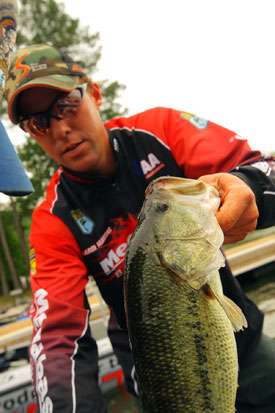
Tackle is a wide ranging topic. It covers just about everything save your boat and motor. In this monthly series, Aaron Martens, one of the most detail-oriented and methodical anglers fishing the Bassmaster Elite Series will offer tips on how to help us get the most out of it.
Every five weeks he'll discuss the selection and care of everything in your boat — line, rods, reels, terminal tackle, sinkers, hooks, hard baits and plastics, as well as anything else that comes to mind.
In between all that Martens will tell us how to make and equip simple repair kits we can carry when we're on the water. And he'll instruct us on when and how to use those kits. In short, he'll cover it all.
Let's get started.
Lesson 1: Caring for your line
Let me start off by saying that high-quality line is an investment. For the most part you'll get what you pay for. My preference is for Sunline. In my opinion it's the best line on the market today, and it's surprisingly affordable if you take care of it.
Line is the only link between you and the fish. Nothing is worse than tricking a big bass into biting your lure, getting a solid hookset, and then watching her swim away after she breaks the line. In almost every case that can be avoided.
Sometimes a break-off is caused by a poor knot or a nick that weakens the line. That's the usual excuse we give, anyway. We'll talk about how to avoid those things in the future. Far too often, however, break-offs are caused by heat.
There's nothing you can do to your fishing line — especially fluorocarbon — that's as hard on it as letting it get too hot. At the worst it'll break when you put pressure on it. Even if it doesn't break, though, line that's been overheated will get stiff and kinky. It's like casting wire.
There are several things you can do that'll help you avoid heat damage to your line. Probably the most obvious is to store it in a cool, dry place when you're not actually fishing. In my case, that's the garage. If you have a basement that's probably an even better place to keep it. Either way, keep it as far away as from the furnace or any other heat source as possible.
I keep my spools in plastic boxes with lids that close tight. You can find them at Lowe's or Home Depot where they keep their storage containers. If I'm going to store my line for several months, I wrap the spool in thin plastic before I put it in the box. Saran Premium Wrap works great.
In my boat I always bury my line boxes under my lure boxes in the coolest compartment I can find. I don't want it to get any more heat than is absolutely necessary. If the air temperature is above 80 degrees, I carry it with me when I leave the boat.
OK, maybe I get a few stares in the restaurant when I set my fishing line down next to me while I'm eating lunch, or when I'm holding it in my hand while doing an interview. I'll admit it — sometimes I hear them whispering behind my back saying I'm crazy. But, that's better than a bunch of guys patting me on the back at the weigh-in telling me how bad they feel for me after I lost a big fish because my line broke.
If you do mess up and let your line get hot, don't despair. As a practical matter, one day (or two or three lunches) in the boat won't destroy good line. It'll survive that much heat, unless it's really extreme like 100 degrees or something.
If you have any doubts about your line's quality you should test it before you throw it away. You can do this by wrapping it around a fence post or some other fixed object and pulling real hard on it. If it doesn't break it's probably good. There's no need to replace good line with good line. That's a waste of money, something none of us can afford.
A lot guys say you should keep your line out of the sunlight. I suppose that's true to some extent, but I think guys worry too much about that. Modern lines will take a lot of sun. Now, I don't recommend that you set it in direct sunlight, or leave it out for hours on end. But, the big thing is heat. That'll kill you a lot quicker than the sun ever will.
Basically line care boils down to three things. First, buy the best line you can afford; Sunline should be your first choice. Second, take care of it; high-quality line is really inexpensive if you make it last. And finally, when in doubt, test it; don't throw line away unless you know it's bad.
I regularly fish with line that's three or four years old. I fish the Elite Series with that stuff. It's fine. I also have some specialty lines that are 10 years old. I wouldn't hesitate a minute to use them if the occasion arose. All you need to do is buy the best and take care of it.





